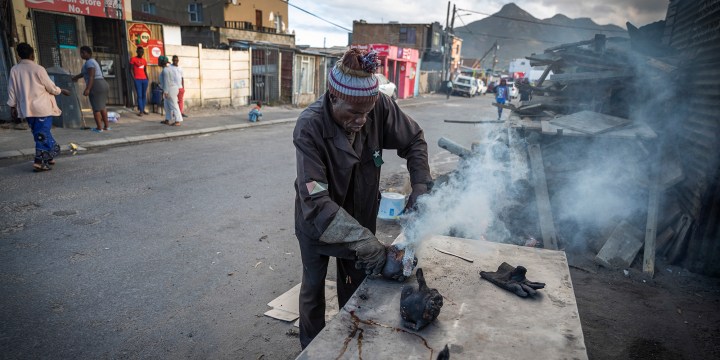CORONAVIRUS OP-ED
Food safety in informal food hubs takes a back seat because of Covid-19

The informal food sector in South Africa fulfils an essential role in the fight against hunger and is a R360-billion a year industry. But it has been walloped by the national lockdown, which has had a severe impact on the 70% of residents of informal settlements who buy from these traders.
The Covid-19 pandemic has caused a sharp focus on our health, not only as individuals, but also as societies. The health emphasis caused by the Covid-19 outbreak is, however, paradoxical when we think about how serious we are about food safety and our health. Recent interviews with informal food traders highlight a lack of infrastructure and the subsequent lack of refrigeration as a significant challenge to their food businesses. This phenomenon makes one wonder about the safety of food products sold in these informal hubs. Unfortunately, these concerns have been placed on the backburner by the national lockdown related to Covid-19.
A bit more than two months ago taxi ranks, bus stations, informal settlements, downtown cities and their surrounds were characterised by the bustle of commuters, the delicious smell of freshly prepared meals and the social chitter-chatter of patrons in need of an affordable meal during lunch breaks or dinner on the go. Since the national lockdown on 27 March 2020, in response to the Covid-19 pandemic, the smells of food and the chitter-chatter of socialising patrons have largely disappeared from the country’s streets.
The silencing of these bustling food hubs and recent remarks by fellow researchers, Dr Jane Battersby and Dr Marc Wegerif, led to the further unpacking of our own research in these informal food hubs. The first is that during the national lockdown, specifically under Levels 5 and 4, only the informal food traders who sell uncooked foods were allowed to do business. Secondly, only those traders that have existing municipal permits were granted this privilege.
The last noteworthy point is that 70% of residents in informal settlements buy from these traders because of their extended business hours, and flexible product offerings suited to people’s budgets. Despite the informal food sector fulfilling an essential role in the fight against hunger, and being a R360-billion a year industry, it has been walloped by the government-imposed national lockdown.
To grasp the multifaceted challenges that our country’s informal food traders are soon to face post-lockdown, a brief overview of the pre-Covid status: at the end of 2019, researchers in the Department of Agricultural Economics, Extension and Rural Development at the University of Pretoria interviewed 145 informal traders who sold cooked and uncooked beef products throughout the North West as part of a rapid reconnaissance of the province’s beef value chain. Our research disinterred seven interesting facts about this understudied market segment:
(1) 88% of the informal food traders indicated that selling food is their sole source of income;
(2) 25% of these traders did business from an “open-air stall” and lacked proper infrastructure to protect them and their food products from the elements;
(3) 78% sold cooked beef products while the remainder sold fresh and frozen beef products;
(4) Their most popular beef products are beef stew (36%), beef brisket (17%) and tripe, cow heads, cow heels, lungs and bones (16%);
(5) 45% of the traders purchase their beef daily with 34% purchasing from the nearest supermarket;
(6) Only 4% of the traders saw these supermarkets as competitors, and 71% indicated other similar traders as the major competitors; and
(7) Of the interviewed traders only 68% own a fridge or a freezer, the remainder had to make do with cooler boxes and other means to store their perishable stocks.
The major challenges faced by the informal food traders are crime (15%), few customers due to high competition and unemployment (12%), and a lack of infrastructure (11%). These challenges spilled over into challenges related to food waste, the lack of equipment, electricity and water, and it is precisely these challenges that raise concerns about food safety.
In a recent blog post, Prof Tom Reardon and his colleagues predicted that the effects of Covid-19 will be the strongest in the downstream segments of retail and food service. Their prediction included businesses like the informal food traders that are vulnerable to Covid-19-related closures. These traders already find it difficult to control their own hygiene practices, that of their suppliers and of their customers. It is also difficult for them to implement social distancing. These vulnerabilities linked to the nature of their businesses and the infrastructural challenges highlight food safety concerns.
Although only 2% of the traders indicated that it is a challenge to apply for municipal permits to conduct business, we suspect that many of the traders were operating without the necessary documentation. Our opinion was supported by Jane Battersby (2020), who stated that pre-Covid-19 the state ignored the growing problem of informal food traders operating without municipal permits. Yet, the same traders who were allowed to trade without permits pre-Covid-19 were forcefully closed during the lockdown. If these traders were allowed to operate without permits, what assurances are there that these products are compliant with food safety regulations? Often the clients of these traders consume out of desperation to have something to eat without considering food safety as the Covid-19 regulations restricted many other channels of food distribution. These seemingly double standards make us wonder: is Covid-19 regarded superior to food safety?
We agree with the statement made by Marc Wegerif (2020), “this important sector has been overlooked in the past”. We believe that it is only during this time of a national disaster that the challenges that these informal food traders face daily are pushed to the forefront. Our view is that the informal food sector is in desperate need of intervention. It is only through support and nurturing that these vulnerable businesses will be able to provide safe food to the people of South Africa. We recommend three broad interventions:
(1) These informal food traders need to be supported with appropriate infrastructure, electricity, water, and sanitation from which they can successfully, and safely run their businesses;
(2) Government officials need to support and speed up these traders’ applications for municipal permits to conduct their business; and
(3) Additional mentorship and support to those businesses that are not yet complying with the necessary food safety standards to ensure safe food for all need to be considered.
These are necessary requirements for the formalisation of these informal food traders and the first step to upgrade these informal food value chains, thereby enhancing the livelihoods of the people depending on the informal food sector. DM
Dr Danie Jordaan, Dr Mmatlou Kalaba, Dr Marlene Louw and Dr Melissa van der Merwe are all lecturers in agricultural economics with the Department of Agricultural Economics, Extension and Rural Development, University of Pretoria.
World Food Safety Day is commemorated annually on 8 June.


















 Become an Insider
Become an Insider